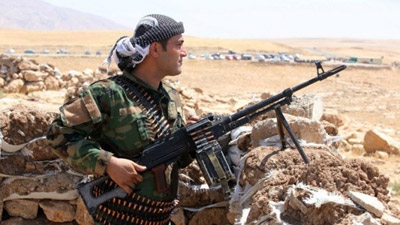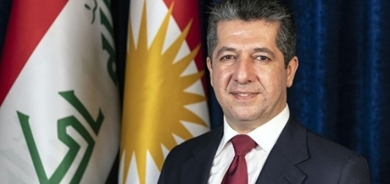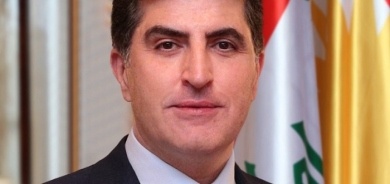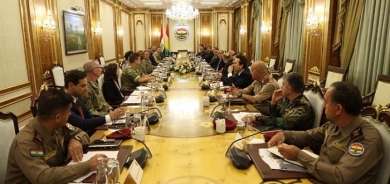With the Kurds Fighting Islamic State in Syria
September 23, 2014
From Media

Terry Glavin
In the shade of pine trees at a hilltop command post deep in this dismembered country's far northeast, Adam Derike, commander of a company of youthful Kurdish guerrillas, will not guess the outcome or even the good sense of President Obama's plans to lead an air-war coalition against Islamic State jihadis.
But the 35-year-old Cmdr. Derike, who leads 45 fighters with the Syrian Kurdish YPG, or local defense forces, was unequivocal about two things: By failing over the past three years to arm and fund Syria's democratic opposition, the NATO powers have squandered the opportunity to confront both Bashar Assad's regime in Damascus and the forces of the Islamic State. And now, the commander says, NATO is risking the alienation of the West's strongest and most capable allies remaining in the region—the stateless Kurds.
"This is my personal opinion," Cmdr. Derike says. "Daash [the Arab term for Islamic State] is a terrorist movement, and the Kurds are willing to cooperate with every side to fight with Daash, because Daash is fighting humanity in general."
Cmdr. Derike can't see the logic in Mr. Obama's emphasis on attempting to merely contain the Islamic State or destroy its infrastructure in Iraq. "Everybody should be fighting them, in Syria, Iraq, everywhere. We are fighting them all the time."
The Syrian Kurds also appear to be the only force in the region that can claim significant strategic victories against the Islamic State. Across the border in Iraq, when the terrorist group launched a pogrom against the Yazidis of the Sinjar Mountains last month, the Iraqi army and the peshmerga forces of Iraq's Kurdish Regional Government collapsed under the onslaught.
U.S. airstrikes blocked Islamic State fighters advancing on the Kurdish city of Irbil in Iraq. But the YPG local defense forces, and notably their women's command, the YPJ, came to the rescue on the ground. They opened up a security corridor for perhaps 150,000 Yazidis to escape into Kurdish strongholds in Syria's mountainous frontiers with Turkey and Iraq.
In recent days the YPG has been put to an especially daunting test of its combat capacity in the Syrian Kurdish canton of Kobani, a border district roughly midway along the 500-mile Turkish-Syrian frontier. YPG and Islamic State fighters have been battling in the area since June, but last week Islamic State forces launched a major offensive involving hundreds of fighters, tanks, armored vehicles and heavy artillery. Over the weekend the YPG evacuated at least 100,000 panicking Kurdish civilians from Kobani, guiding them into Turkey.
On Monday the YPG high command in Syria announced that while heavy fighting continued, the Islamic State assault was being repulsed. The Syrian Observatory for Human Rights reported that Islamic State fighters had made no gains against the YPG since Sunday, but local Kurdish officials said they were still "very worried" because the small city of Kobani was surrounded on three sides by Islamic State forces.
Cmdr. Derike insists that Islamic State's fighting prowess has been vastly overestimated. "They are good at terrorizing people, and psychological warfare," he says. "They have weapons and money, but they are not strategic fighters." Only two weeks earlier his company had confronted Islamic State fighters near the Iraqi border village of Rabiya. "It was a victory for us," he said, adding that his men killed 10 Islamic State fighters, repelling the invaders while suffering no casualties.
The commander's views about Islamic State's battle skills are shared by Abdulsalam Ahmad, co-chairman of the Kurdish provisional government of Rojava in Syria. Mr. Ahmad says that Mr. Obama's alliance against Islamic State should include Syria's Kurdish leadership, including the YPG. "We have put up a strong resistance to Islamic State. We have had many attacks from them, and we have fought them well."
The main impediment to outside support is the YPG's intimate association with the outlawed PKK, the Kurdish Workers Party. The PKK is a secular insurgent group in Turkey that the government of Recep Erdogan considers a terrorist organization, and thus so do most NATO countries.
While several NATO countries are arming Masoud Barzani's Kurdish Regional Government in Iraq, the YPG in Syria has been forced to fight Islamic State largely alone, with weapons acquired on the black market. Kurdish leaders in Syria, Turkey and Iraq hope that recent events, not least the Turkish government's refusal to participate in Mr. Obama's emerging coalition, will change that.
The Islamic State's alarming gains in Iraq, especially the capture of Mosul, Iraq's second largest city, have had the effect of strengthening Kurdish cross-border ties. Mr. Barzani's administration has set out to normalize relations with the YPG and the Kurdish provisional government of Rojava in Syria. Last weekend the PKK in Turkey, the YPG in Syria and the Kurdish regional government in Iraq jointly called for Kurdish fighters and "international forces" to unite in ousting Islamic State fighters from Kobani.
The Free Syrian Army, still nominally backed by the U.S. but with little to show after three years of pleading for military aid, has now officially aligned with the YPG. The Free Syrian Army and a formation from the Saudi-backed Islamic Front signed a cooperation agreement with the YPG last week.
The pact was immediately followed by the first joint Free Syrian Army-YPG clash with Islamic State. The operation was carried out at a bridge across the Euphrates River, where the YPG command claims that 15 Islamic State fighters were killed.
But back at that YPG hilltop command post near the village of Shirik in Rojava's Jazeera canton, the guerrilla commander Adam Derike said he wasn't especially hopeful that the Syrian Kurds will get commitments from the Western democracies.
"We follow the international rules of law. . . . We saved the Yazidis from death," he told me. "The Islamic State is fighting humanity. We take our orders from the people, and we are fighting for humanity.
"But all the time, if you are fighting for humanity, you are fighting alone."
Mr. Glavin is a columnist for the Ottawa Citizen.
WSJ











